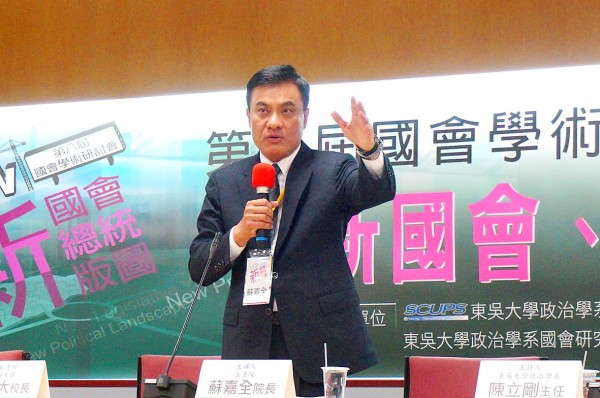《TAIPEI TIMES 焦點》 Su Jia-chyuan details career in politics

Legislative Speaker Su Jia-chyuan speaks at Soochow University in Taipei yesterday . Photo: Tu Chu-min, Taipei Times
By Alison Hsiao / Staff reporter
Legislative Speaker Su Jia-chyuan (蘇嘉全) yesterday outlined the progress of Taiwan’s legislative reforms and laid out his vision of a more transparent and improved legislature, now that the Democratic Progressive Party (DPP) is enjoying its first majority.
Su said in a speech at Soochow University that he decided not to use the speech his aides had prepared for him about the DPP’s proposals for reform, but instead decided to share his experiences with the audience.
“Many unexpected things also happen in the legislature that do not benefit from academic observation,” he said.
“When I was first elected to the [now-defunct] National Assembly in 1986, I think I was one of the 84 elected by Taiwanese in the “election for additional members” that year. The rest, more than 1,000 representatives, first took office in China in 1947, then came to Taiwan in 1949 and were never replaced,” Su said.
He said that at the time there was a Taiwanese saying about the assembly: “Those who are in their 60s are considered young; octogenarians and nonagenarians are everywhere; there are more than 100 aged over 100.”
A complete election of the National Assembly did not take place until 1991 and the legislature did not see a complete re-election until 1992, when Su also won a seat.
“The elections were only made possible after fierce struggles and confrontation,” Su said.
“The power of the executive branch was still extremely strong during the time of the first completely ‘re-elected’ legislature. The interpellation in the general assembly was not in a question-and-answer format as it is now, but at that time the questioner asked questions for 30 minutes and then the premier and other ministers took turns to answer the questions — that in total also took 30 minutes,” Su said.
It was not until during the fourth legislature — elected in 1998 — that two speaking podiums were set up in the chamber for the general question-and-answer session and the lawmakers earned the right to assign their questions to a certain minister or to the premier, he said.
“It is a matter for academics to study if the question-and-answer format has facilitated better communication or if it has descended into lawmakers ‘putting on a show,’” he said.
Su said one idea under consideration is that lawmakers and Cabinet members could sit opposite each other in front of microphones that are only switched on when it is their turn to speak.
“However, there are opposing views to the suggestion, so the discussions are ongoing,” he said.
Su said that before cross-caucus negotiations began to take place, the DPP — then in the minority — would filibuster and obstruct legislative proceedings during votes to avoid being overwhelmed by the Chinese Nationalist Party’s (KMT) majority.
“It was clear that the gridlock was a waste of everybody’s time, so informal negotiations began to take place, which later became formal cross-caucus negotiations according to established legislative regulations,” he said.
“Then lawmakers got overly reliant on such negotiations, to the point that the function of the committees was evidently undermined,” Su said, adding that this is the reason negotiations would now be recorded and posted online.
“Maybe that is why the number of negotiations has decreased, but the positive aspect is that it is conducive to a ‘committee-centered’ legislature,” he said.
While many have been calling for a “legislative reform agenda,” Su said that as reform is a continual process, there is no agenda for it.
The speaker said that the legislature would continue to improve its accessibility to the public and its transparency, and set examples on issues such as carbon reduction and the provision of childcare centers.
新聞來源:TAIPEI TIMES















